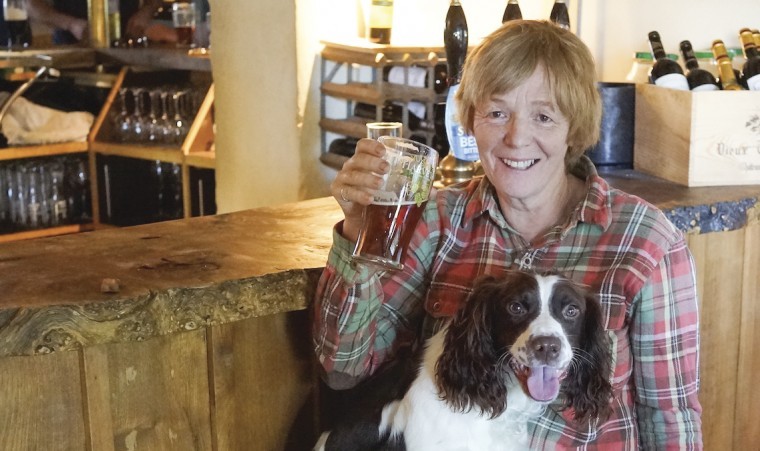The wrong decision can be costly. It was dusk when I spotted a heifer showing signs of thinking about calving. We discussed whether to leave her out with her cohorts to calve naturally, or get her into the shed for easy access and electricity. Not wanting to cause the heifer unnecessary stress, and on the basis that half that herd had already calved with no problems, we left her undisturbed in the field.
The good news is that heifer produced a healthy female calf. But the bad news was that she also pushed out her uterus – not a pleasant sight early on a Sunday morning. Despite the vet successfully relocating her uterus, she died later. So now we are caring for a very rambunctious calf, nicknamed Lulu. Now why couldn’t that young heifer have calved in daylight hours? And where was Nigel? Away courting! He has an uncanny knack of being absent when there’s a drama going on.
By coincidence and on the very same day, in a different herd, an old faithful cow due to be culled suddenly died for no particular reason. I know it goes with the territory, but it’s so upsetting. A sad and disheartening time. It was however intriguing to discover there’s a disposal cost discount available. It’s not quite two for the price of one and I’m certainly not promoting it.
Meanwhile my better half decided the soil had dried up enough to get some oats into the ground. It was the usual race against the forecast of impending rain, but just to pile on the pressure, we were also booked to go on Eurostar. Is there ever a good time for farmers to go away? It was a chaotic departure, with Nigel receiving plenty of frantic instructions.This trip was a gift/reward from the newlyweds for hosting their wedding: a visit to Belgium, three nights staying in Bruges and a tour of Flanders fields.
I’ve previously been reluctant to go under the British Channel, but was impressed by this mode of transport. My only grumble was that I like observing farming practices as we pass. It flashed by so fast, my brain struggled to interpret what my eyes were seeing. In Brussels we changed onto a double decker train, giving us an excellent vantage point. The Belgians were also busy cultivating. We observed corn intermixed with strips of cabbages, leeks, potatoes, and sugar beet. Plots of maize were being harvested. The landscape was flat with no hedges, few fences and occasional ditches. We didn’t notice any field margins. Several coppices were scattered about and a few pheasants. We saw shapely Belgian blue cattle and the odd dairy herd, but few sheep. There were more silage pits than bales. Some farmhouses were adjoined to the livestock buildings.
The world war one tour of the battlefields was a sobering experience, realising the true cost of war devastating so many families. We saw the trenches and understood the terrible fighting conditions experienced. I particularly noted the grim looking field hospitals. In Ypres we attended the last post ceremony “Lest we forget” held at the Menin gate, which is a memorial for 55,000 missing soldiers. The saddest thought is that the killing in the world is still going on today. What is the matter with the human race? I wish its energies could be channelled into more constructive activities.
Bruges is rich in history and a beautiful city, with canals, cobbled streets and picturesque architecture.It is a place renowned for two of my favourite things, chocolate and beer. We explored a museum about chocolate. We skipped the brewery tour in favour of tasting very drinkable beer. Mind you we paid tourist prices, and on leaving the hotel were charged a government levied visitors’ tax. Could our government be missing a trick? Eating waffles, chocolate and ice cream sweetened the blow: delicious. Good thing that Tilley and I restart our beating duties this week. I’m hoping a diet won’t be necessary.
I didn’t envy Belgian farmers when we learnt about the “The iron harvest.” We stopped at a nearby farm and witnessed this year’s haul. A table overloaded with shells, hand grenades, guns, iron spikes, bayonets etc. Farmers here cannot get insurance for damage caused. Recently a local farmer wanted to plant a crop of potatoes in a previously grass field. When he ploughed up 80 unexploded mustard gas shells, he quickly changed his mind and called in the army to deal with it. On the western front it is estimated one tonne of explosives were fired for every square metre of land. One in three fired did not detonate. Close on five per cent of these shells contained poisonous gas. Astounding facts: should Belgians embrace minimal tillage I wonder?
Back home minimal tillage is said to be more beneficial for the soil than ploughing. But could that spell the end of our traditional ploughing matches? I hope not as I particularly enjoy seeing the horses working: what a great sight they are. I’m no expert on straight furrows but find it fascinating seeing the different vintage machines being nurtured along and admire the pride and effort that goes into match ploughing.
This year I braved entering some exhibits into the South East Ploughing Match domestic section. My hens were delighted to receive a first for their eggs – clearly the result of their escapades into my garden. I picked an individual bloom from the daliahs planted as wedding decoration in the old farmyard water trough. I forgot to take anything to display it in, so snaffled a plastic pint glass. Incredibly, I won the Egerton silver cup for the best bloom. Last night the final cow to calve produced twins out in the field. Some days are better than others.




